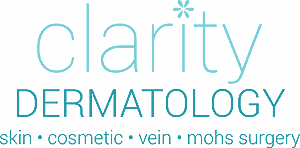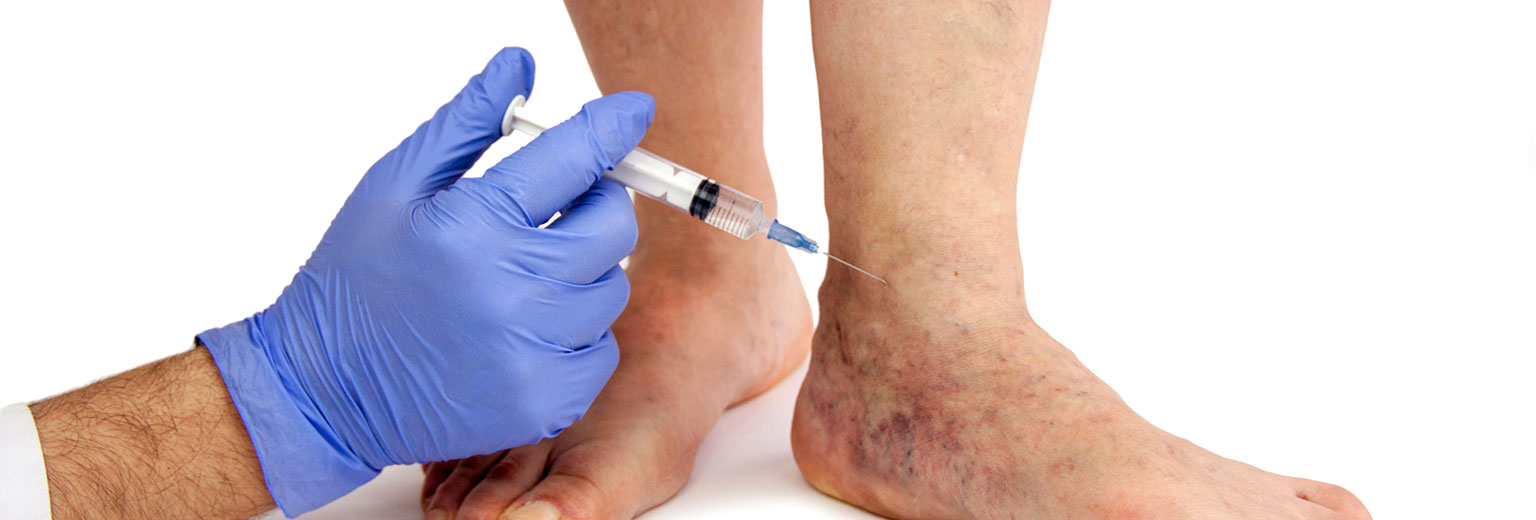Ultrasound-guided sclerotherapy (USGS), also known as endovenous chemical ablation (ECA), is a minimally invasive treatment used to treat ill-functioning varicose veins. These varicose veins can often stem from the saphenous vein system (see endovenous laser ablation), and cause progression of vein disease, contributing to your symptoms. In the USGS procedure, these abnormal varicose veins are injected with an FDA-approved medication (Asclera, polidocanol) through a small IV. The medication irritates the inner lining of the vein, causing it to close. During injection, ultrasound is used to ensure that the medication stays within the intended veins, thus minimizing risk of complication. The treated veins are gradually reabsorbed by the body over a period of months.
After the procedure, you may experience bruising, tenderness, lumpiness, staining of the skin, and redness which will lessen with time. You may take ibuprofen 400 mg (if not allergic and no kidney problems) up to three times a day for one week following the procedure for pain. More serious complications, such as deep vein thrombosis (blood clot in the deep veins), pulmonary embolism, allergic reaction, or infection can also occur, although they are rare. If you suspect any serious complication, please feel free to contact the office at any time.
Frequently Asked Questions
USGS is generally well-tolerated by our patients. The procedure involves starting a small IV, which can cause mild discomfort. The injection of the medication is often painless, although some patients describe a mild burning sensation.
USGS treatments do not generally require antibiotics. Dr. Jensen will review your medical history at your initial consultation to help you determine if antibiotics are recommended prior to your procedure.
Generally, the USGS procedure takes less than 15 minutes to perform. An additional 15 minutes are spent mapping the vein that is to be treated. Your appointment will usually last about half an hour.
Several easy steps can be taken to ensure a positive experience and an excellent outcome. Make sure to get adequate rest prior to the procedure. Additionally, make sure to drink plenty of fluids on the day of the procedure (as long as there is no restriction on your fluid intake). Do not wear your compression stockings on the day of the procedure, as this can make it more difficult to start the IV. Eat a normal meal (breakfast or lunch) as you would on any other day. Take your prescription medications as per routine.
Please tell us if you have a history of an atrial septal defect (ASD), ventricular septal defect (VSD), patent foramen ovale (PFO), as you should not have this procedure if you have been diagnosed with one of these conditions. Please also tell us if you have a history of migraines, blood clots, require antibiotics for regular dental cleaning, are taking any blood thinners, or if you may be pregnant.
We wish to ensure that your questions are answered and that you are comfortable with the procedure. Dr. Jensen is happy to answer your questions at any time, including those that arise during the procedure. He will walk you through the process step by step so that you will feel confident that you are receiving the best care possible.
Compression socks: We recommend that you bring all of your compression socks so that we will be able to choose the most appropriate one for you to wear following your procedure. If you decide to purchase compression socks somewhere besides Clarity Dermatology, we recommend that you bring them in prior to your first procedure to make sure that they will provide adequate compression.
Shorts: It is often convenient if you bring shorts that can be pulled up high. If you forget/don’t have shorts, we can provide a drape to cover the areas that do not need treatment. We want to make sure you feel comfortable at your appointment.
Comfortable walking shoes and weather-appropriate clothing: Following your procedure, we will ask you to walk for 1 hour. Patients often prefer to walk outside. However, you may also walk inside, if desired.
In general, you should continue to take your medications as directed by your prescribing physician. Do not stop your medications unless told otherwise, as it is rare that you would need to change you daily regimen. If you have specific questions, please bring them up at your initial consultation or preoperative appointment. Dr. Jensen will review your medication list with you and make recommendations based on your particular health history.
-Following the procedure, we will help you place an appropriate compression stocking. Keep your compression stocking on for 3 days, 24 hours per day. After these 3 days, wear your compression stocking for an additional 10 days during the day, for a total of 13 days.
-We recommend that you walk for one hour immediately after the procedure and prior to leaving in your vehicle. You do not need to report back to us after your walk unless you experience a problem (i.e., severe pain, bleeding, or any other concerning symptom).
-Walk every day for an hour.
-You may exercise as long as it does not increase your abdominal pressure (such as weight lifting, high impact aerobics, running, horseback riding, etc). These activities may be resumed 2 weeks following the procedure.
-Do not travel (long flights or car trips) for at least 2 weeks following the procedure. If travel is unavoidable, we recommend walking for 10-15 minute for every hour of travel.
-Avoid saunas or hot baths (more than 100° F) to prevent reopening of the vein for at least 2 weeks.
-No heavy lifting (more than 20 lbs) for at least 2 weeks.
It is common to have mild post-treatment tenderness in the treatment area. You may also feel a cord-like bump under the skin in the treatment area. This is the expected outcome of the USGS procedure and is normal. Over the next several weeks, you may notice a tan discoloration develop over the treatment area. This will usually resolve over a period of weeks to months.
If you experience significant discomfort, please call us for directions. Often, tenderness can be alleviated with a combination of ibuprofen (Advil, Motrin) and acetaminophen (Tylenol). Warm compresses can also be used to decrease pain. However, if you have any concerns, we encourage you to contact us.
Complications following USGS are unusual, and routine follow-up is not generally needed. However, if you have any concerns, please contact the office.
Contact Us Today!
Call (720) 686-7546 or click here to fill out your online request to schedule your consultation with our dermatologists today. Clarity Dermatology serves Castle Rock, DTC, Parker, Niwot, Boulder, Fort Collins and all nearby areas. Our practice looks forward to serving you!







